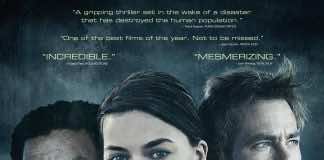
Even though Lizzie was directed and written by Craig William Macneill and Bryce Kass, two men, the new movie about legendary murderess Lizzie Borden feels undeniably feminist. And though it’s a true life tale that has often been retold in books, film and television — and let’s not forget that rhyme — the film feels incredibly vital and contemporary. This is all probably thanks to actress Chloë Sevigny, who produced the film and embraces the titular role with so much vigor it oozes from the screen, even if at time it feels self-conscious.
Borden found the brutally mutilated bodies of her father and step-mother inside the family’s Fall River, Massachusetts home in 1892. Though she was tried and acquitted in the murders, she remained the prime suspect until she died in 1927. Lizzie kicks off with a startling scene, which includes the gruesome aftermath of one of the murders. Then there’s a flashback to six months earlier and the arrival of the Bordens’ new maid, Bridget Sullivan (Kristen Stewart), to their house. The matriarch of the home, Abby Borden (Fiona Shaw), tells the Irish woman she will be addressed as “Maggie” while giving her a tour of the home. Not long after, Lizzie pops into the new maid’s attic room and introduces herself by contradicting her step-mother and asking for her real name. Thus begins an unsteady kinship to defy the rules of the house and by extension the patriarchy.

Scene after scene there are incidents where such conflict plays out. As soon as father Andrew Borden (Jamey Sheridan) says something oppressive, Lizzie counters. She decides on her own to teach Bridget to read. When Bridget asks why she volunteers her time to do this, she responds, “Men don’t have to know things, Bridget, women do.” At times it feels a bit heavy-handed, and like Sevigny’s acting, self-aware. Still, by film’s end, it only adds to the potency of Lizzie’s extreme actions.
The theme plays out visually, as well. When Andrew connives his way into Bridget’s room at night to assault her, DP Noah Greenberg shoots from behind him and in close-up, making the attacker all back and hands, dehumanizing him for his act. Bridget doesn’t resist. The next morning, we see Bridget crouching against an exterior wall, which is foregrounded, almost as if closing in on her. When she later tells Lizzie, “Understand the weight your father’s name carries,” it echoes the powerful Harvey Weinstein and accusations against him.

As Andrew is a property owner who has evicted many a tenant, hand written threats begin to appear at his doorstep (can you think of another reviled property owner in today’s age insinuated in sex scandal?). Fearing his life could very well be in danger, he asks his step-brother John Morse (Denis O’Hare) to take over his financial dealings should something happen. John is the embodiment of everything that’s terrible and threatening about men. He uses the most reviled references you can imagine to women directly to Lizzie. When she confronts him about his game to take over her and her sister Emma’s (Kim Dickens) inheritance, he tells her, “You’re just another girl past ripe who thinks she’s too special for this world,” before assaulting her. It’s only the appearance of Bridget that makes him stop.
In such an environment, the two women form a bond. They have a particularly sensual scene together as Bridget helps Lizzie get dressed. The two nearly kiss only to be interrupted by Abby. As noted earlier, much of the movie plays with such build-up giving reason for Lizzie to hate her father and step-mother. Though it does feel repetitive at points, when the murders come, kicking off with a sinister pan of the camera across what at first appears to be an empty bedroom, it makes the horror of the scenes all the more unsettling. Greenberg’s camera work is pretty outstanding throughout. Despite the use of zooms in several scenes and some creative movement, there is nothing to compare to this quiet, disturbing pan, as it heralds the arrival of an act so abominable as to stand in strong opposition of all of what came before. That the slow pan of the camera finds Lizzie in all her stark nakedness, freed of the ankle-length and neck-high dresses meant to hide are womanliness, breathing heavy and holding an ax speaks to her rebirth as a woman as well as a violent reach to claim her autonomy. It’s a chilling yet cathartic moment unmatched by anything before it while speaking to the film’s sly, dramatic build-up.
Lizzie runs 105 minutes and is rated R. It opens in our South Florida area in the following counties and theaters:
- MIAMI-DADE: AMC Aventura 24, AMC Sunset Place 24, Cinépolis Coconut Grove, South Beach Regal 18 Miami Beach
- BROWARD: AMC Pompano Beach 18, Classic Gateway Theatre
- PALM BEACH COUNTY: Regal Shadowood 16, Cinemark Boynton Beach 14 and XD, Cinemark Palace 20
For screenings in other parts of the U.S., visit this link. Roadside Attractions sent us an online screener for the purpose of this review.









